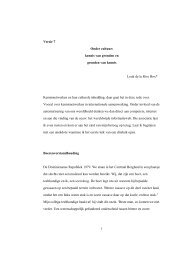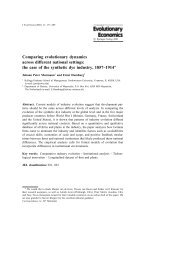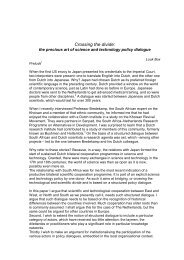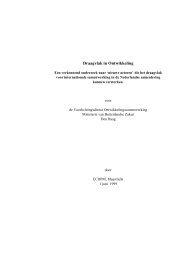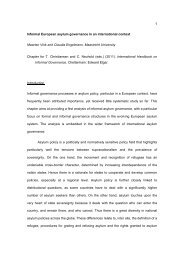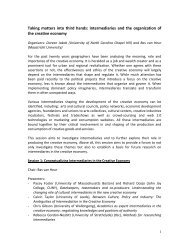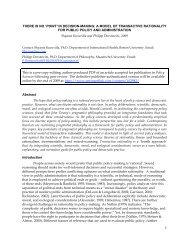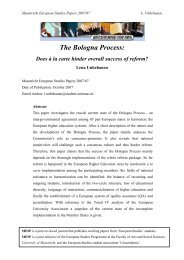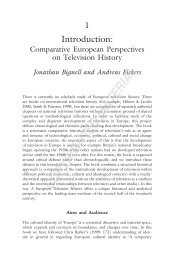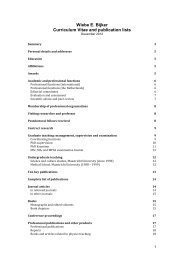Winds of Change: The Europeanization of National Foreign Policy
Winds of Change: The Europeanization of National Foreign Policy
Winds of Change: The Europeanization of National Foreign Policy
Create successful ePaper yourself
Turn your PDF publications into a flip-book with our unique Google optimized e-Paper software.
Maastricht European Studies Papers 2007/01 Bennet Strang<br />
Thus, Ireland, Austria, Finland and Sweden can be taken as examples <strong>of</strong> states which all have<br />
adapted their foreign policy regimes in response and adaptation 35 to joining the EU 36 (Wong,<br />
2005). Accordingly, they moved from neutrality to post-neutrality. EU membership has, in a<br />
similar vein, Europeanized Spain’s foreign policy 37 . As a result, it acquired a distinctive EU<br />
pr<strong>of</strong>ile (Torreblanca, 2001). Thinking further about the incremental top-down adaptation<br />
process in which states are reactive and muddle themselves through, one should not expect<br />
identical outcomes from adaptation. <strong>The</strong> reason is that the states’ different domestic<br />
‘seedbeds’ condition dissimilar national repercussions (Wong, 2005). This is the same in the<br />
foreign policy domain, where “…the pre-existing orientation <strong>of</strong> external relations which<br />
Member States...” (Manners/ Whitman, 2000, p. 262) have needs to be taken into<br />
consideration 38 .<br />
Those ‘orientations’ sometimes find their expression in a national foreign policy<br />
domaine privé, which no member state would accept to be affected by eventually conflictual<br />
EU positions (Hill, 1983). One can, thus, safely say that “…adaptation is more a function <strong>of</strong><br />
attitude than time…” (Manners/ Whitman, 2000, p. 248). Subsequently, the two forms <strong>of</strong><br />
adaptation, i.e. both rationalist adaptation with preferences remaining stable and constructivist<br />
adaptation, where policy learning 39 results in a change <strong>of</strong> preferences, will be dealt with.<br />
Turning, as above-mentioned, to both constructivist and realist approaches, the<br />
rationalist perspective holds that adaptation takes place according to the logic <strong>of</strong><br />
consequentiality. This means that egoistic actors take the self-interested and strategic decision<br />
to carry out adaptation only when it is in the state’s rational interest (de Flers, 2005).<br />
Nonetheless, this approach is not all-explanatory, as it only covers half <strong>of</strong> the picture.<br />
<strong>The</strong>refore, it needs to be complemented by a social constructivist perspective, focusing on<br />
35 <strong>National</strong> adaptation refers in this context to the change in content <strong>of</strong> the countries’ foreign policies.<br />
36 Obviously, “EU adaptation appears to play an important role in the ‘modernisation’ <strong>of</strong> Member<br />
States’ [twenty-first century] foreign policies…” (Manners/ Whitman, 2000, p. 246).<br />
37 After the country had emerged from Franco’s dictatorship, it needed to consolidate the young<br />
democracy and regain international esteem. For this purpose, an extensive foreign policy<br />
transformation set in, which was triggered by EU membership and in the course <strong>of</strong> which Spain<br />
abandoned its neutrality by achieving NATO membership (Torreblanca, 2001).<br />
38 Hence, “[i]f domestic modifications occur, their extent and their inherent mechanisms will depend<br />
not only upon the European input, but also upon the particular conditions <strong>of</strong> the national level on<br />
which they act…national opportunity structures…” (Major/ Pomorska, 2005).<br />
39 <strong>Policy</strong> learning can be defined as “‘…actors chang[ing] not only how they deal with particular<br />
problems but also their very concept <strong>of</strong> problem solving – resulting form the recognition that they and<br />
other actors face similar conditions, have mutual interests, and share aspirations’” (Ruggie quoted in<br />
Sjursen, 2003 p. 17). Having learned from the devastating disunity in the course <strong>of</strong> the Iraq crisis, the<br />
Member States devised the European Security Strategy (ESS), which is an example and outcome <strong>of</strong><br />
policy learning (Mahncke, 2004; Lebl, 2004).<br />
12



